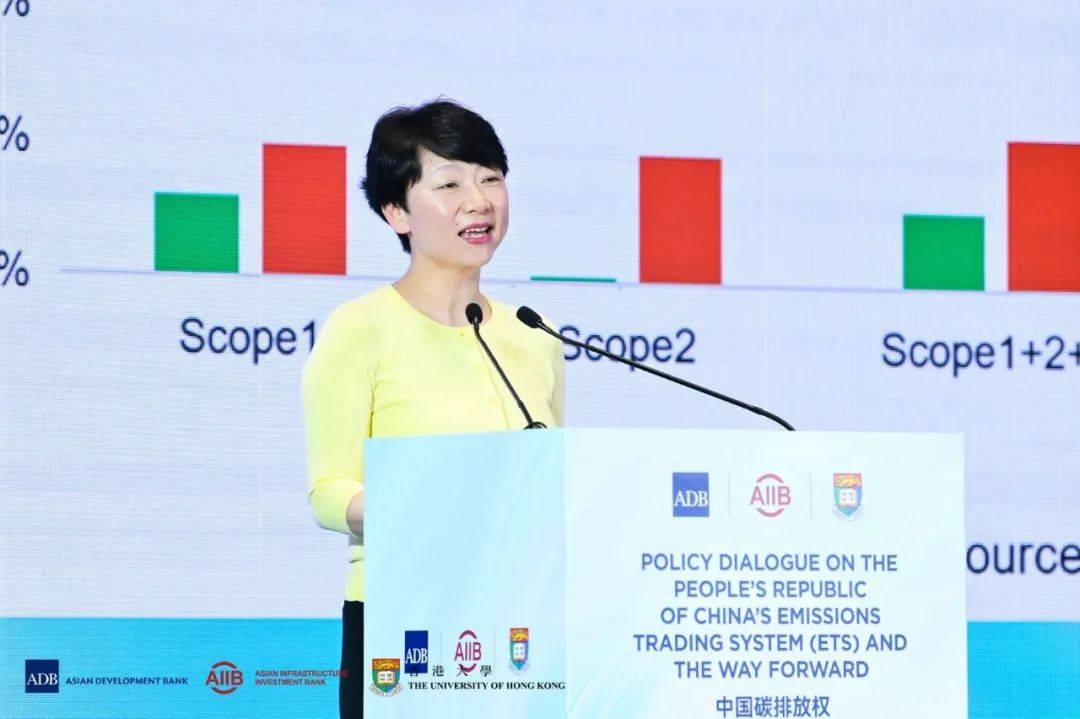
Pictured is Zhang Xiaoyan.
In her speech, Zhang Xiaoyan stated that the continuous emission of greenhouse gases has exacerbated global temperature rises, making climate change a top priority. She noted that current climate finance is insufficient to meet the goals set for climate action, emphasizing that it must increase at least fivefold annually to address this challenge. To combat climate change, China has set dual carbon goals: "carbon peaking by 2030" and "carbon neutrality by 2060." Currently, China's carbon emissions represent 27% of the global total. In this context, zero-carbon financial markets and carbon emissions trading systems are critical tools for achieving these goals. Zhang Xiaoyan discussed her research on the carbon emission reduction impact of green bonds, analyzing data from A-share listed companies from 2014 to 2022 and carbon emission indicators provided by Trucost. The study found that issuing green bonds significantly reduces corporate carbon emissions and emission intensity. Another study explored the relationship between carbon emissions and the cross-sectional returns on corporate bonds, finding that higher carbon emission intensity correlates with higher expected bond returns. Further, her research on carbon emission pricing and existing carbon risks showed that higher carbon emission intensity predicts higher expected stock returns, with the carbon emission premium becoming more pronounced after announcing the dual carbon goals. Zhang Xiaoyan highlighted the ongoing development and significant impact of China’s carbon emissions trading system. Since its initial pilot in 2013, the national carbon emissions trading system was officially launched on July 16, 2021. It covers 2,162 key emission units in the power generation industry, accounting for approximately 4.5 billion tons of annual carbon dioxide emissions, making it the world’s largest carbon market. By 2023, the carbon emission statistical accounting system had been further refined. She also cited examples from relevant papers on the impacts of China's carbon emissions trading system on provincial and corporate carbon emissions and corporate green innovation. In conclusion, Zhang Xiaoyan summarized three implications for developing countries: First, the establishment of a zero-carbon financial system is crucial for promoting carbon emission reduction. Developing countries should create environments conducive to the development of zero-carbon financial markets that align with their national priorities and contribute to global climate mitigation efforts. Second, establishing an emissions trading system (ETS) is a lengthy and ongoing process that includes determining coverage, setting total limits, allocating emission rights, establishing trading platforms, developing regulatory mechanisms, making adjustments, and aligning with international standards. Developing countries need continuous monitoring, evaluation, and adjustment to ensure the effectiveness of their ETS. Third, it is beneficial for developing countries to actively learn from international experiences. When designing its carbon emissions trading system, China referred to international best practices and learned from the experiences of other nations. Developing countries can study the experiences of China and others to inform the design and implementation of their own systems, learning from both their successes and challenges.